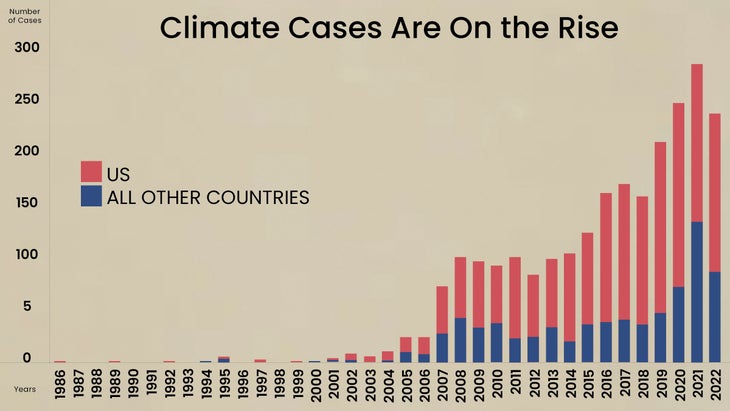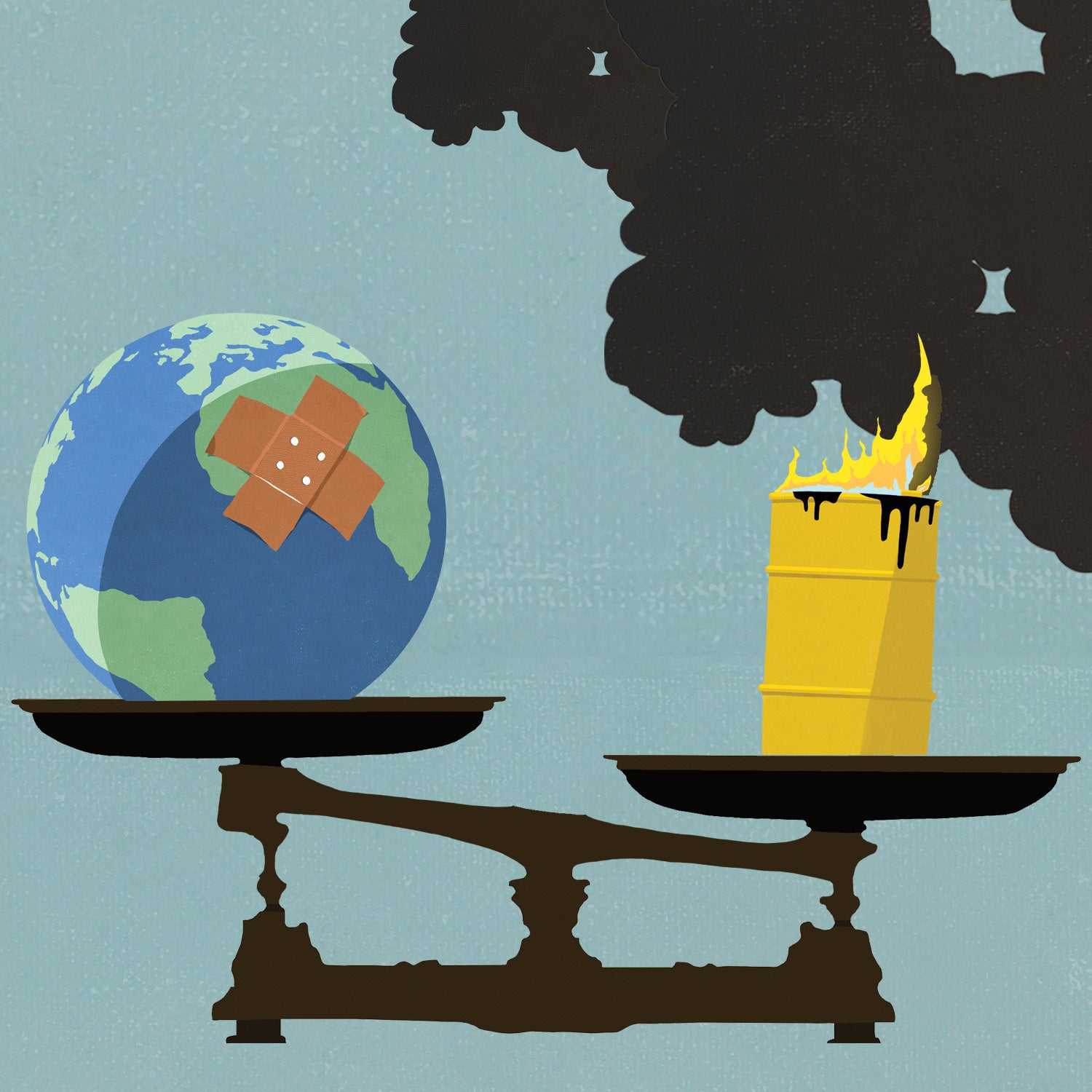It’s one of the first lessons we are taught in kindergarten: when you make a mess, you clean it up. This premise, called the Polluter Pays Principle, is at the heart of a wave of lawsuits—many of which have been launched by citizens—that demand accountability for the climate crisis we all face.
The lawyers managing these suits point the fingers at two culprits responsible: state governments that have failed to protect citizens from climate change, and Big Oil, which has lied about the impact of emissions on the warming planet, fought the transition to cleaner energy sources, and continued to drill, baby, drill.
“We’ve seen a significant and steady uptick of climate cases in the last 15 years or so,” says Michael Gerrard, faculty director of Sabin Center for Climate Change Law at Columbia University, who tracks climate change litigation around the world.

Something else that has seen a major uptick in recent years: big storms, wildfires, droughts, floods, and heat waves. These weather atrocities have become normal; we’ve come to expect the weather to be one of the top stories on the morning news. Lawyers and advocates believe citizens should be allowed to sue for damages that arise from these and other climate-related events.
“These are not ‘normal’ natural disasters,” says Aaron Regunburg, senior policy counsel with Public Citizen’s Climate Program, which fights the climate crisis by promoting clean, affordable energy and holding polluters accountable. “These events are caused by climate change and are the result of specific decisions made by Big Oil. They result in many deaths and billions of dollars of property loss and emergency services.”
In lawyerspeak, this translates to well-defined legal offenses, such as public nuisance, reckless endangerment, and outright homicide, among others. And attorneys around the globe are suiting up for a fight.
Youth Climate Cases Are on the Rise
Of the almost 1,800 U.S. climate lawsuits in Gerrard’s database, about 25 of them have been filed on behalf of children by Our Children’s Trust (OCT), a nonprofit public-interest law firm representing kids from diverse backgrounds who suffer the effects of climate change. According to Gerrard, these cases, which center on youth telling their impact stories, attract the most media attention. “They involve appealing young people who tell compelling stories, without the dry technical details involved in many other climate cases,” he says. “And it’s easier to talk about constitutional rights than complicated statutes and regulations.”
Our Children’s Trust has had some big recent wins.
In 2023’s Held v. Montana, the firm represented 16 kids from Montana, and argued that the state’s policy of ignoring greenhouse gas emissions when approving energy policies violated plaintiff’s rights. The children testified that climate change had both physical and psychological effects on them, such as distress, anxiety, and asthma. In what has been heralded as a landmark win, the district judge ruled in favor of the children and ordered the state to incorporate greenhouse gas emissions analysis into future environmental projects.
The organization celebrated another victory in June, 2024. In the case (HDOT), OCT sued the state government on behalf of 13 children, arguing that its transportation system generates high emissions and violates the plaintiff’s constitutional rights to live healthy lives. The case reached a settlement which forces Hawaiʻi to overhaul its ground and inter-island sea and air transportation systems to achieve zero emissions by 2045.
These victories raise public awareness and put pressure on governments to address climate change, says Gerrard. They are a key part of the strategy, and when climate cases like these are won—validating our constitutional right for a clean climate— they set important precedents that can help build cases against the real villains: the fossil fuel companies.
Holding Fossil Fuel Companies Accountable: A Key Piece of the Climate Crisis Puzzle
Suing Big Oil is no easy feat. Preparing a case requires exhaustive preparation, time and patience, and deep coffers. It can be a daunting prospect for overworked district and states’ attorneys.
Enter: Richard Wiles, the president of The Center for Climate Integrity (CCI), a nonprofit funded by philanthropists who support climate work, like the Rockefeller Family Fund. CCI’s mission is “to empower communities and elected officials with the knowledge and tools they need to hold oil and gas corporations accountable for decades of lying about climate change.” Wiles compiles evidence and creates strategies for attorneys to use to prosecute fossil fuel companies. Wiles’ work has supported pending cases in Massachusetts, Connecticut, Maryland, New Jersey, Minnesota, and Colorado, among others.
Accountability is a predicate for good policy. And we can’t get the climate policy that we need until we hold these companies accountable for the damages.
The common thread in his cases is the allegation that Big Oil willfully ignored climate change and that decades ago they actually predicted the climate change devastation we are now witnessing. He and his firm have amassed troves of evidence. A reads: “Present thinking holds that man has a time window of five to ten years before the need for hard decisions regarding changes in energy strategies might become critical.” And from 1981 says: “. . . it is distinctly possible that the CPD (the acronym for Exxon’s corporate planning department) scenario will later produce effects which will indeed be catastrophic (at least for a substantial fraction of the earth’s population).”
In other words, they knew the climate crisis was coming, they covered it up, and they lied, all so they could continue raking in billions.
Wiles likens this scenario to Big Tobacco’s coverup of rising cancer cases in smokers in the eighties and nineties. Cigarette companies knew their products were going to cause massive damage and kill people, but they lied about it and engaged in a massive disinformation campaign. In the end, Big Tobacco was found liable for knowingly deceiving the public about the risks of smoking and in 1997 the four largest tobacco companies were forced to pay more than $350 billion in damages. “It’s the same scenario with fossil fuel companies,” Wiles says. “For decades, they’ve been protecting their profits, ignoring the health of the planet, and we’re looking for them to pay for their deception.”
In September 2023, Governor Gavin Newsom of California announced The People v. Big Oil, a high-profile deception case alleging that five fossil field companies knew about all the havoc climate change would a wreak and hid it, causing taxpayers to pay for the damage and destruction. California is seeking a multibillion dollar abatement fund to provide for mitigation, adaptation, and resilience.
In Wiles’ opinion, more cases alleging climate deception is a positive for the environmental movement. “Accountability is a predicate for good policy. And we can’t get the climate policy that we need until we hold these companies accountable for the damages,” he says. “Once Big Oil loses 50 or 100 cases, once they’re found liable for damages, lying, racketeering, wrongful death, and other atrocities, we’ll be in a different place. If we don’t hold them accountable, if they continue to be able to lie, if they continue to be able to just pollute with impunity and greenwash us about their commitment to climate solutions, we’re never going to solve the problem.”
Wiles acknowledges that winning lawsuits alone will not stop climate change or alter policy. But he believes that climate change cannot be stopped without these suits, which erode the social license of the companies he believes should be held accountable.
Wiles points to the legal saga pharmaceutical company Purdue Pharma as an example. Years of court cases over the company’s sales and marketing of opioids, such as Oxycontin, eventually eroded the company’s public credibility. “Nobody’s looking at Purdue for advice on much of anything anymore, right?” says Wiles. “They have no pull in Congress anymore, and nobody is lining up with them.”
In other words, Purdue Pharma has become toxic and lost its clout. Wiles wants to see fossil fuel companies in the same sinking ship.
How to Get Involved in Climate Cases
So, how can you flex your own legal muscle in the ongoing fights against climate change? The experts I spoke to said you don’t need to hire a lawyer or join up with a class-action lawsuit in order to have an impact. There are easier ways to get involved that don’t require court cases and lawsuits.
The big one is voting. As citizens, it’s the most powerful action we can take to ensure that climate-friendly politicians are in place to make policy changes.
Regunburg also recommends leveraging your district attorney. “Know who your DA is and be sure to support the right ones,” he says. “Influencing a local DA is a helluva lot easier than influencing a senator. Call them and encourage them to file a climate deception suit.”
You can also take one minute to add your name to to encourage the U.S. Attorney General to keep the Big Oil lawsuits coming. Because death by a thousand cuts is still death.
Doing right by the planet can make you happier, healthier, and—yes—wealthier. �����ԹϺ���’s head of sustainability, Kristin Hostetter, explores small lifestyle tweaks that can make a big impact. for her twice monthly newsletter or write to her at climateneutral-ish@outsideinc.com.


